D1.2 Roadmap of the research team in SDWM
This document presents a Roadmap for the research group, as a general, strategic plan for enhancing the research activities and results in the field of smart data for water management.
The Roadmap is based on a SWOT analysis of the UPB group’s research, and on the technology survey document elaborated in this WP, more specific on the research directions to be followed by the research group over the next 5 - 10 years. This will allow achieving an optimal synergy between the project outcomes and other funding opportunities and will be used as guidelines for future research and innovation of the Smart Data for Water Management Group.
The Roadmap is developed in collaboration with scientists from partnering institutions; it is aligned with the partners’ research agendas, and takes into account the needs of European industry and government stakeholders.
The document includes a short presentation of the project teams, the results of the SWOT analysis and the positioning of the UPB research group in the EU research context, the future research directions resulting from the technology survey document (deliverable D1.1), and the roadmap for the research group.
The roadmap will present not only the research directions and the objectives to follow, but also a strategy for organizing the research activities in order to gradually respond to these objectives and cover the gap between UPB team and project’s partners.
| Site: | DATA4WATER |
| Course: | Deliverables |
| Book: | D1.2 Roadmap of the research team in SDWM |
| Printed by: | Guest user |
| Date: | Saturday, 24 May 2025, 8:24 PM |
1 Introduction
There are several Key indicators with high value for Romania, such as: “Knowledge-intensive services exports as % total service exports” - Romania ranks on the 7-th position within EU; “Share of renewable energy in gross final energy consumption” - rank 8 within EU; “New doctoral graduates per thousand population” and “License and patent revenues from abroad” rank 13 within EU. However, there are many key indicators where Romania ranks 20 or bellow (from the total 28 countries EU). A better national strategy and intensified participation in European programmes, on relevant topics, are required.
In this deliverable we highlight a short presentation of the project teams and their competences, a SWOT (Strengths, Weaknesses, Opportunities and Threats) and w make a brief presentation about positioning of the research group from UPB. Then we present the roadmap and the progress toward excellence in the field of smart data for water.
1.1 Short presentation of the project teams
The consortium consists of three leading research partners:
- Biccoca University, Milano, Department of Computer Science, Systems and Communication (DISCo);
- Fraunhofer-Gesellschaft zur Förderung der angewandten Forschung e.V., Fraunhofer Institute FOKUS, Berlin, Germany (FOKUS);
- UNESCO-IHE Institute for Water Education, The Netherlands, Delft, (UNESCO-IHE), Department of Integrated Water Systems and Governance;
and the applicant organisation:
- University Politehnica from Bucharest, Department for Computers (UPB-CS).
The leading research partners complement each another.
Fraunhofer FOKUS addresses important challenges in the society and the smart cities of the future, including access to information, economic and sustainable use of resources, smart mobility and a modern governmental administration. In its projects, Fraunhofer FOKUS establishes useful ties between industry, governmental administration, users and the people. As a member of important standardization bodies, the institute contributes to the definition of new standards in information and communication technologies.
DISCo is a department that performs both education and research, and has top results in the field of ICT for water resource management. It brings the experience of involving in research activities not only experienced researchers and teaching staff, but also master and PhD students, thus ensuring the sustainability of the research, through trained people. It has also strong links to the applied research, through the Consorzio Milano Ricerche. DISCo has a fruitful cooperation with UNESCO-IHE, being a good example of excellence in interdisciplinary researches.
UNESCO-IHE brings the excellence in defining, modelling, and applying advanced technologies in the field of water management. More specific, the Integrated Water Systems & Governance (IWSG) department covers a broad range of subjects, from hydrological and hydraulic modelling sciences, engineering, information technology, mathematics, knowledge management, and innovation studies, to sociology, law, economics, public administration and political science. It is also a good example of combining research with education at the level of master and PhD.
The Distributed Systems team of UPB develops research projects in large-scale distributed systems middleware and applications, in cooperation with similar international centres. Its projects include MonALISA monitoring platform and MONARC 2 simulator with Caltech and CERN; DataCloud@work advanced, and autonomic storage mechanisms for cloud services with INRIA; interoperability in e-government services with Fraunhofer FOKUS; and provisioning of cloud services with VU Amsterdam. UPB team has experience in improving the distributed systems’ middleware and adapt it to the requirements and profile of distributed applications. More recent results are presented in section 1.3.
1.2 SWOT (Strengths, Weaknesses, Opportunities and Threats)
The UPB team performs its research activities in the context of the Romanian higher education and research landscape. According to SCImago country ranking, Romania is on place 41, with 167 H index, while the country placed on the first position has a value of 1648 for the H index (http://www.scimagojr.com/countryrank.php).At country level, there has been a continuous evolution of the quality parameters, the best achievements being registered in 2013, as presented in Table 1. However, there are some differences, regarding the subject area.
Table 1. Romania’s ranking based on h-index.
|
Romania's position |
Rank |
|
Computer Science |
34 |
|
Computer Science - Artificial Intelligence |
28 |
|
Computer Science - Signal Processing |
33 |
|
Computer Science - Computer Networks and Communications |
34 |
|
Computer Science - Information Systems |
36 |
|
Engineering |
31 |
|
Engineering - Control and Systems engineering |
29 |
|
Engineering - Safety, Risk, Reliability and Quality |
34 |
|
Environmental Science |
39 |
|
Environmental Science - Management, Monitoring, Policy and Law |
15 |
|
Environmental Science - Environmental Engineering |
24 |
|
Decision Sciences |
34 |
|
Decision Sciences - Information Systems and Management |
21 |
|
Decision Sciences - Statistics, Probability and Uncertainty |
46 |
|
Multidisciplinary |
43 |
A brief overview on national level, shows the difference between the countries involved in the project, regarding the scientific output (documents) - Fig. 1 and the international collaborations - Fig. 2.
Figure 1. All subject areas - Documents.
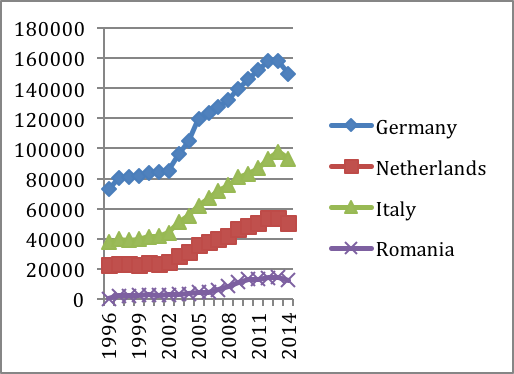
Figure 2. All subject areas – International collaboration.
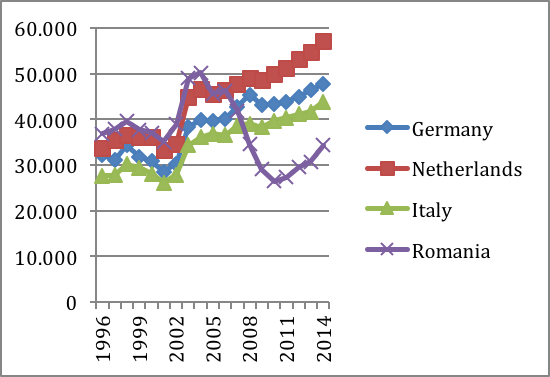
The trends for specific subject areas are similar, showing that Romania is behind the partner countries, having an upward trend for the scientific output, as shown in Fig. 3, for Computer science and in Fig. 4 for Environmental sciences.
Figure 3. Computer science – Documents.
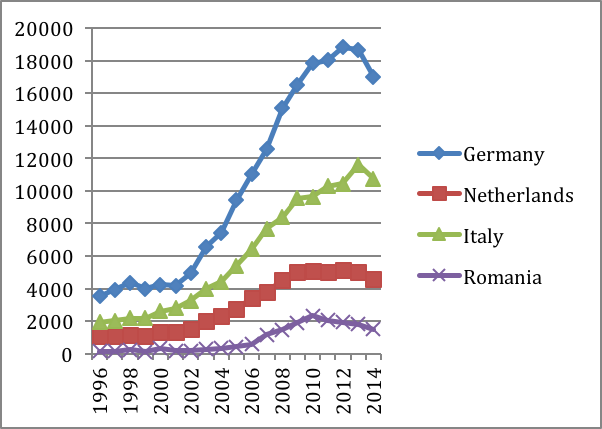
Figure 4. Environmental sciences – Documents.
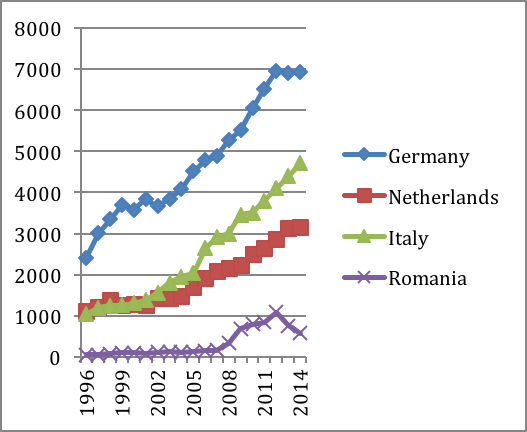
Regarding the international collaboration, ups and downs can be observed. The number of international collaborations registered in the Computer science and in the Environmental sciences, for Romania, are comparable with those of the partner countries, as shown in Fig. 5 and 6, and represent a opportunity for joining the international research teams.
Figure 5. Computer science – International collaboration.
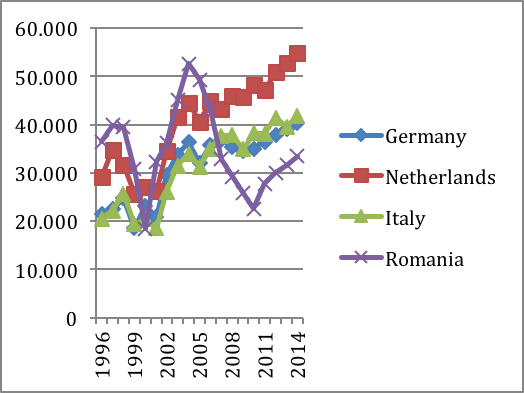
Figure 6. Environmental sciences – International collaboration.
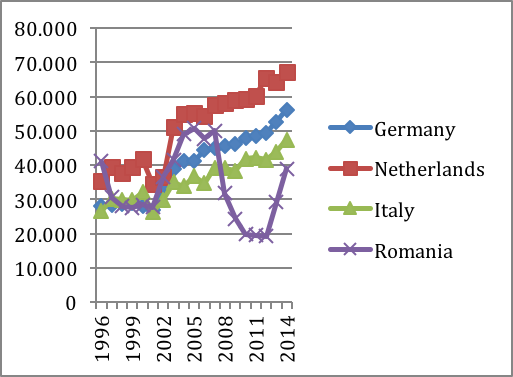
The UPB team, involved in the project, aiming the enhancement of the KPI in the field of smart data for water management is based in the University Politehnica of Bucharest, at the Computer Science Department.
The Strengths of the research team related to the subject area of the project are:
- The research team has a both broad and in-depth knowledge in the field of computer sciences.
- It has tradition in research, in ICT, gained through participation at more than 20 national and 15 international projects, and reflected in more than 500 papers, and 30+ book chapters/books.
- The strong link between education and research: we award bachelor, master and PhD degrees, in the research team we involve both PhD supervisors and PhD students.
- We have modern facilities, in a new research base, dedicated specially for researches computer science and control systems.
- The particular strengths are in development of middleware solutions for distributed systems, in design of composite and IoT architectures and in development of analytics for complex systems.
The Weaknesses we are aware of are:
General weaknesses:
- Lack of staff, involved exclusively in research, in the university. Research is done basically by teaching staff, that are overloaded with teaching and administrative tasks;
- Diminished interest in research activities, towards young graduates, due to the wage gap between research and the labour market;
- Lack of administrative support from the university level;
- Unstable, unpredictable financing.
Specific weaknesses:
- Unfocused researches – spread of research topics;
- Few transfers of research results in industry;
- Few results in interdisciplinary researches;
- Although the scientific output is high, the articles/papers in high ranked publications/conferences is modest.
We are aware of the following Opportunities:
- Both ICT and Environmental research are major topics in the Smart Specialisation Strategy of Romania;
- The D4W project gives us the possibility to enhance our weaknesses;
- Research is a major component of the evaluation process of the QA in higher education in Romania and of the teaching staff.
The Threats we identified are:
- Unstable and insufficient financial support for research;
- Not enough involvement of universities in technological transfer, and interest from the side of companies towards research;
- Research projects for companies are not taken in account in the research evaluation;
- Increased loose of interest of young specialists for research.
1.3 Positioning of the research group (UPB)
Achievements – short presentation of UPB papers
The UPB research group has technical and scientific achievements in coordination of research projects including EC funded projects (Data4Water, ERRIC, EU-NCIT, EGEE, SEE-GRID, Sensei, P2P-Next, etc.). The group has also experience in software development including the definition of software architectures, quality management processes, testing, and interoperability. The main research interests are: modelling and simulation, monitoring and control of large scale distributed systems, big data platforms, cyber-infrastructure and cyber-physical systems, vehicular ad-hoc networks, context-aware mobile wireless applications, solutions for natural resource management (water quality) using software platforms (deployed in Clouds), smart city architecture.
Using modern information technology, we proposed innovative solutions for water resource management, using the current state-of-the-art and situation of watershed science and management [Mocanu, 2013]. We concentrate our research on water pollution and we proposed a system for pollution detection, alert and pollution propagation simulation on the CyberWater (a national research project coordinated by our group) platform [Vacariu, 2015]. We designed decision support systems and decision makers during water pollution accidents [Salah, 2015], integrated decision support system for the evaluation of water pollution [Salah, 2014] and planning water quality management [Popescu, 2014]. The research was extended with decision support in risk related environments oriented on pollution events [Ciolofan, 2013], performances of monitoring water environments [Suciu, 2015] and prediction for water quality using bio-inspired methods [Pop, 2014].
Models are very important in the development of information systems for water management and they concern not only hydrology aspects, but also representations of complex software applications [Ionita, 2015a, 2015b]. We device an information-centric system for supporting decision-making [Mocanu, 2013], using advance techniques of modelling with SoaML [Ionita, 2013].
We investigate different approaches of integration of different Cloud computing platforms and services, in order achieve scalability, provisioning of resources in real time, to have a simplified deployment and management of resources and applications for river water quality [Negru, 2015]. And we proposed methods to support social‐based mobile networks [Pop, 2015a].
In environmental research the measurement, collection, storage, the same institution does not carry out the processing and analysis of data. So, there is a great complexity in environmental statistics motivated by the fact that heterogeneous data from different sources and collection principles are analysed simultaneously. To cope with this, we analysed different context-aware environments for the Internet of Things [Cristea, 2013] and identify the main requirements for data manipulation. There are dependencies between the measured quantities that usually do not follow fixed laws or rules, but reveal random variability. Besides this variability in the nature of the environmental problem there is variability of data in time and space. And measurements in time are not repeatable. So, behind huge volume of data, the research topics close to Big Data is motivated by data velocity and variety, and we made a comprehensive analysis on Big Data platforms for the Internet of Things [Ciobanu, 2014].
In the field of autonomous distributed systems, UPB group work more specifically in the optimization o task scheduling for many task computing [Sfrent, 2015], resource-aware management in heterogeneous distributed systems [Vasile, 2015], fault-tolerance of resource management in dependable distributed systems [Olteanu, 2012], evolutionary approach of scheduling and resource management [Pop, 2016], Big Data processing and distributed data aggregation services [Serbanescu, 2015], by complex simulation scenarios and real-world application and approaches. We proposed a new deadline scheduling for aperiodic tasks in inter-Cloud environments as a new approach to resource management [Pop, 2015b], [Pop, 2013]. We extended our research with directions on: GPU MapReduce framework for data intensive applications (Nitu, 2014), energy efficient cloud storage service [Negru, 2013], secure access to cloud resources [Musca, 2013] and a direction that is applied for any solution proposed, which is numerical optimization for smart data applications [Pop, 2014].
One focus of the distributed laboratory is towards research activities on applications of mobile and pervasive computing and sensing. The advent of new wireless sensor platforms in the hands of the masses (through recent miniaturization and subsequent introduction of sensors into commodity consumer electronics such as mobile phones, PDAs) makes possible a shift towards solving global-scale problems using public-sensing capabilities [Suciu, 2016]. Today we see a continuous push in this direction, and the advent of a new era of participatory (participatory sensing) or opportunistic (i.e. people-centric sensing) awareness. We embrace the holistic vision of massive quantities of real-time information becoming access push rather than demand pull on a global case (e.g., tweets, sensing info, GPS data). In this way we believe future enterprises will be (a) context aware, (b) dynamically configurable, and (c) multi-identity oriented virtual entities that manifest themselves in many different ways and re-invent themselves over and over again. Among results we mention: CAPIM is a context-aware platform designed to assist mobile applications make smarter assisted decisions (react to situation, contextually understand their environment); the SPRINT protocol is among the most advanced today social-based opportunistic networking routing protocol [Ciobanu, 2015] [Ciobanu, 2013], SENSE is a collaborative selfish node detection and incentive mechanism for mobile networks where collaboration among users is a most [Ciobanu, 2014], HYCCUPS is a contextual platform designed to assist smartphones take intelligent decisions to collaborate towards minimizing their energy footprint [Marin, 2014], and other solutions where we combined social aspects of mobile devices with context information towards advanced wireless networking aspects [Chilipirea, 2015].
Another focus of our laboratory is on Big Data and optimisation algorithms. As data volumes increase at exponential speed in more and more application fields of science, the challenges posed by handling Big Data in the Exabyte era gain an increasing importance. High-energy physics, statistics, climate modelling, cosmology, genetics or bio-informatics are just a few examples of fields where it becomes crucial to efficiently manipulate Big Data, which are typically shared at large scale. With the emergence of highly scalable infrastructures, e.g. for Cloud computing, multiple application classes that perform complex data processing (data mining, online transaction record management, etc.), initially reserved to governments and large corporations that could afford the underlying infrastructures to run them, now become accessible to a large public. In previous projects such as MonALISA or the Associate Team DataCloud@work collaboration between INRIA Rennes and UPB, the team obtained results on scalable data management in Cloud environments and self-adaptive behaviour of large-scale distributed systems based on monitoring information. We used evolutionary methods and models, like bio-inspired techniques for resources state prediction [Visan, 2011], a decomposition based algorithm for resource state prediction [Istin, 2010], and a pattern detection model [Dinu, 2011]. Using these techniques, we analysed the possibility to use them for resource management in an adaptive way.
On the top of middleware, we proposed a hybrid local-cloud framework for smart farms [Apostol, 2015], which represent an intelligent, integrated, cloud services-based system, using advanced computer technology, automation and communications to increase product quality and business development in the area of farming. We proposed solutions for real-time alerts [Raducu, 2015] and for time series analysis and visualization [Bojan, 2015].
Current research activities within the laboratory are focused on the research and development of solutions for managing large collections of data (e.g., in Smart City scenarios), collecting and aggregating context data, understanding and reasoning about context (through machine-learning techniques, semantic and temporal reasoning), the use of social awareness to deliver better sensing capabilities, and development of models for privacy, and data usage restrictions. Among particular applications of these solutions are: optimization of traffic, reduction of air-pollution in urban environments, the development of safety and non-safety applications to assist the drivers make informed decisions. The laboratory is, therefore, currently investigating issues at the intersection between the areas of Big Data, mobile and pervasive computing, context representation and reasoning, and privacy, with direct applications on creating the support for intelligent traffic systems, decision support system for water resource management.
Short presentation of UPB projects related to D4W
- CyberWater
Home page: http://cw.hpc.pub.ro/
Project Title: Prototype Cyberinfrastructure-based System for Decision-Making Support in Water Resources Management
Integrated and comprehensive approaches in decision-making processes associated with the management of water resources are necessary in acute problems, triggered by direct or indirect human interventions in the natural systems within which we live. Water resources management requires the processing of a huge amount of information with different levels of accessibility and availability and in various formats. Often, the data acquisition needs to be acquired, transmitted and accessed in real time. Equally important is to have access to historical data for calibration and validation of the models. With regard to the accessibility of stakeholders to information, there are situations when information is to be accessed only by designated stakeholders, but there is a huge amount of information that is, and should be handled, as public information.
The overarching goal of the CyberWater Project is to create an e-platform using advanced computational and communication technology for managing water and land resources in a sustainable and integrative manner, focused on pollution phenomena.
The progress of information and communication technologies makes possible the access to relevant information and to provide feedback on the observed processes by means of e-services and ancillary data repositories. The multi-agent approach encompasses agent types with various behaviour and specific interaction to the environment that are implemented as web-services. The proposed architecture of our prototype is presented below.
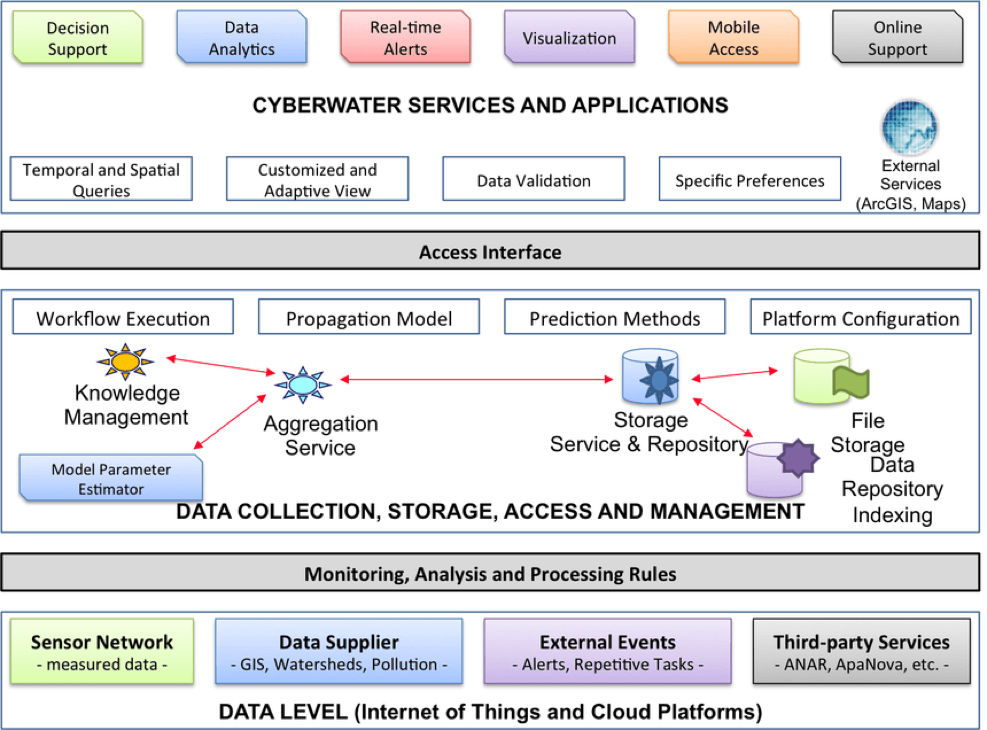
The specific objective is to implement a pilot platform for monitoring water pollution related phenomena and support to decision making in critical situation. Solving such water problems requires an interdisciplinary approach (hydrology, hydraulics, water quality, and ecosystem).
The composite application framework will integrate existing software and new e-services compliant to Directive 2007/2/EC regarding metadata for spatial data sets, data series and data services for environmental resources, protection and conservation.
- CLUeFARM
Home site: http://cluefarm.hpc.pub.ro
Project Title: Information system based on cloud services, accessible through mobile devices, for quality improvement of products and business development in farms
CLUeFARM is an Information system based on cloud services, accessible through mobile devices, for quality improvement of products and business development in farms.
The overall objective is to create an intelligent, integrated, cloud services-based system, using advanced computer technology, automation and communications to increase product quality and business development in the area of farming. The specific objective is to create an integrated control system for controlling the process in greenhouse crop production, using the services available on mobile devices. The services also offer simple and cheap integration of the existing infrastructure in various types of companies involved in agriculture. The added value generated by the system results from the creation of a virtual space that can be shared by several categories of companies.
The proposed solution is an intelligent system designed to increase the quality of the greenhouse grown products and to support the development of businesses in domains related to agriculture, based on cutting-edge IT&C technologies. Its components are: information infrastructure; the data acquisition subsystem; and subsystem for intervention in process (turning on/off water sources, adjusting temperature, etc.).
- DataCloud@Work
Home site: https://www.irisa.fr/kerdata/doku.php?id=cloud_at_work:start
Project Title: Associated team between KerData and Myriads teams from INRIA Rennes - Bretagne Atlantique and the Computer Science Department from Politehnica University of Bucharest.
DataCloud@Work is an associated team between KerData and Myriads teams from INRIA Rennes - Bretagne Atlantique and the Computer Science Department from Politehnica University of Bucharest. Our research topics address the area of distributed data management for cloud services. We investigated several open issues related to autonomic storage in the context of cloud services. The goal was to explore how to build an efficient, secure and reliable storage IaaS for data-intensive distributed applications running in cloud environments by enabling an autonomic behavior, while leveraging the advantages of the grid operating system approach.
- VANETS
Projects on Vehicular Ad Hoc Networks and Intelligent Transportation Systems
Vehicular Ad-Hoc Networks (VANETs) are wireless ad-hoc networks formed among vehicles on the roads equipped with short range wireless communication devices. Such networks are particularly attractive because of their potential to improve comfort and safety of people in modern urban and highway situations. With the increase of the number of people depending on cars and road infrastructures, VANETs have the potential to optimise traffic conditions, and to reduce congestions and pollution. In University POLITEHNICA of Bucharest we conduct a number of research projects on VANETs. These projects are developed in joint collaboration with the Disco Lab Laboratory from Rutgers University, USA.
- MobiWay
Mobility Beyond Individualism: an Integrated Platform for Intelligent Transportation Systems of Tomorrow
MobiWay proposes the development of a collaborative platform designed to support ITS applications by acting as a middleware connection hub, offering an optimal support to different ITS partners and municipalities through and a data sharing and ITS support service integration platform. The goal is to develop a platform of ecosystems, to allow engaging communities in exploiting the shared value of mobility and collaborative cultures that can be leveraged beyond the classical views of social networks, respectively the current trends of service creation. The project sets out a new vision for using mobile computing capacities for provisioning and support of ubiquitous connectivity and real-time applications and services for smart cities’ needs.
- SideDOWN
Smart Internet Data Downloader and Aggregator
SideDOWN develops connectors for unstructured Web-based resources, and technologies to identify implicit Web entities and extracting information starting from such resources. The project extends the INTEMA platform with new business requirements, such as automatic collection of information, development of guided and profile-oriented search algorithms, personalised views.
- TRANSYS
Models and Techniques for Traffic Optimizing in Urban Environments
TRANSYS proposes the research and development of original models, methods and techniques for optimising traffic quality in urban environments. These solutions will target Intelligent Transport Systems (ITS) and VANET networks. The main objective of this project is the research and development of models, methods and techniques to optimise traffic in urban environments. The project targets the Intelligent Transport Systems (ITS), the solutions being development within the VANET environments. This objective also assumes the development of solutions to reducing congestions in crowded traffic environments, the decrease of air-pollution and the adoption of solution to increase traffic safety capabilities. The derivate objectives complete the main objective with components and solutions defined within the project. The proposed models, methods and techniques will be based on a unitary set of solutions to ensuring security, optimised communication between vehicles and between vehicles and the road infrastructure and ensuring fault tolerance.
- MEDIOGRID
Parallel and distributed graphical processing on the grid structure of geographical and environment day
Industry development and social complexes have in recent decades led to dramatic changes of eco-systems. Level nuisances, pollution, atmospheric carbon dioxide generated atypical behavior of natural phenomena and weather - floods, fires, storms, downpours, droughts, strong winds - for our continent and in particular for Romania. Pursuing such critical events require a huge volume of observational data and high power computer processing in real time. The data come from observational and archived information from satellite images provided by geostationary satellites (e.g.. MSG-1 delivers 300 Mbps at an interval of 15 minutes). The project aims to create a system MEDIOGRID pilot imaging received in real time from weather satellites and resources, in order to extract meteorological and environmental parameters that characterise the state of the atmosphere and land surface. Applicability immediate project is the prognostication early evolution forest fires and floods. Satellite images acquired are preprocessed (decoding, quality checking, geometric correction and calibration), segmented by geographical areas and distributed grid infrastructure for parallel processing (noise masking and highlighting useful information). Images processed and reassembled to allow specialists initial geographic areas used in extracting information semantic interpretations and predictions immediate environmental phenomena studied. The project lasts 3 years. In the first year is done and experience the grid infrastructure and the initial data analysis and processing techniques. In the second year develops core software platform, consisting of basic components and algorithms for image segmentation and parallel processing and distributed data. Follow experimentation pilot processing system based on grid infrastructure. In the third year is developing and experimenting a pilot application specific analysis of social and ecological systems.
- DEPSYS
Models and Techniques for Ensuring Reliability, Safety, Availability and Security of Large Scale Distributed Systems
DEPSYS proposes a unified approach to all the aspects concerning dependable systems, by analysing and designing methods and techniques for improving reliability, availability, safety and security of large scale distributed systems. The main objective of this project is the research and development of models, methods and techniques for increasing reliability, availability, safety and security of large scale distributed systems. The research focus is on Grid systems, but the solutions developed will be applied to other types of systems, like those based on the Web.
- DataWay
Real-time Data Processing Platform for Smart Cities: Making sense of Big Data
More and more applications today use, generate and handle very large volumes of data. In particular, this is true for Smart City applications, which attract a rapidly increasing interest from government, companies, citizens, developers, scientists, etc. They cover a large spectrum of needs in public safety, water and energy management, smart buildings, government and agency administration, social programs, transportation, health, education. They are fed with huge amounts of input data, in various formats, from a continuously increasing number of sources (sensors, governmental, regional, and municipal sources, citizens, public open data sources, etc.), are describe by complex workflow and in many cases impose real-time processing capabilities, useful in decision taking. The DataWay project aims to develop Real-time Data Processing Platform for Smart Cities focusing on making sense of Big Data by extracting valuable information in an intelligent way by aggregation, reduction, retrieval, composition and decomposition of data processing tasks, which can de described by real-time analytics. The DataWay concept is as follow: Big Data is produced by Smart Cities Application and is processed and aggregated (top-down) and data extraction will make sense of Big Data (bottom-up).
2 Roadmap
This section presents the roadmap for the future research activity of the UPB team in collaboration with the partners in this project. From the Roadmap, a detailed operational plan, for the duration of the project, is extracted.
The aim of our research is to improve the water management by the use of Smart Data, more specific, to offer ICT Smart_Data-based instruments and solutions that facilitate the water sustainable management. The research includes the management of drinking water, wastewater, storm water, idustrial water, farm water, city water, watersheds, floods, water pollution, other water-related natural disasters, etc.
While the approach is promising, there are a lot of challenges in Smart Data analysis:
- Heterogeneity of data sources;
- Incompleteness of collected data;
- Large scale of the distributed systems supporting the data processing;
- Data uncertainty due to failures of nodes or to network disconnections;
- Getting useful information;
- water resources monitoring is influenced by agricultural, industry, and ecosystem management
- water resources monitoring is influenced by climate change (for example, it can make data accumulated in databases no longer valid);
- etc.
Despite the challenges mentioned above, the use of Smart Data will impact the models, methods, techniques, technologies and platforms used in ICT water management and will allow:
- use multiple data sources;
- more accurate models;
- more accurate system monitoring;
- real time data processing along with historical data processing;
- alerts;
- predictions;
- decision support;
- system optimisation (performance, fault tolerance, etc.);
- efficient resource usage;
- service adaptation to users’ profiles (community and business leaders, industries, farmers, policymakers, academics, cityzens, and others);
- better understand the coupled human-natural system dynamics;
- find risk mitigation measures for the unintended consequences and side effects like water scarcity, increased pollution, unreasonable use of water, flood, food prices;
- develop strategies for efficient use of water resources;
- etc.
Smart Data support a better organisation of the future research directions in ICT water management:
- explore water synergies with energy, land, food, agriculture, transport, climate change, Smart Cities, and smart home ecosystems; understand the correlations between different factors and facilitate the increase of the value of Smart Data;
- develop technologies and standards to increase interoperability and facilitate data sharing:
- open source platforms or components, and common programming interfaces (APIs);
- selection/development of new data models and metadata catalogues;
- development of new performance indicators;
- develop new privacy preservation techniques and guidelines;
- address the fundamental interconnected nature of watershed resources using a holistic, integrated approach to water management; integrated information-centric system will facilitate the conversion of data to knowledge; the process integrates the hydrological information with the economics, political and social disciplines;
- develop optimized anomaly detection solutions to improve the quality of smart sensors data used in water management;
- develop anonymity protection of data sources that share and interact around content and information on mobile and web-based platforms; data anonymization targets the privacy protection of data sources;
- extend the Cloud to IoT, for optimizing the managing of data for water by rapidly, near to source processing data or analizing and sending it to other IoTs and/or Cloud;
- develop and validate a model and architecture for water resource sharing in Smart Cities.
- improve the performance of Decision Support Systems, which may make use of increasingly more types and amounts of data (e.g., including real time data, geographical data, etc.);
- ensure consumer awareness, induce sustainable changes in consumption behavior, and improve social perceptions for water (focus on citizens);
- develop cost effective technical solutions addressing water monitoring (e.g. sensing, analysis, engagement) for sustainable water management;
- improve the methodology for calculating the true cost of water; reduce the total cost of ownership for water ICT;
- propose evaluation methodologies, guidelines and education to stakeholders;
- improved the social perceptions of water (adaptive pricing strategies, legal and policy challenges);
- develop a support for involving simple citizens in the water management (the process is known as „citizen science” and facilitates the monitoring by simple citizens, government agencies, industry, academia, community groups, local institutions, working together);
- adhere to Open Access initiatives for EU (a tool to facilitate and improve the circulation of information and transfer of knowledge in the European Research Area and beyond);
- propose evaluation methodologies, guidelines and education to stakeholders;
- develop common frameworks and KPIs that allow objective assessment of improvements;
- elaborate sustainable business models for the application of ICT on water management.
3 Progress toward excellence in the field of smart data for water
As a kind of conclusion, this section mentions the use of the Roadmap for the development of the operational plan for the duration of the project, more specific the orientation of the project activities in the directions specified by the Roadmap.
The Roadmap will determine:
- the subjects of "Knowledge Lake";
- the subjects of the international workshop on Cyberinfrastructure for Resource Management and of 3 project workshops;
- the content of the 6 training sessions;
- the content of the 3 summer schools;
- the objectives of the exchange of researchers and PhD students;
- the stakeholders to be involved in our networking activities (companies, government agencies);
- the subjects of future projects proposals;
- partners to future projects proposals;
- subjects of future PhD students’ program;
- subjects of future published papers and others.
4 References
Apostol, Elena, Catalin Leordeanu, Mariana Mocanu, and Valentin Cristea. "Towards a Hybrid Local-Cloud Framework for Smart Farms." In Control Systems and Computer Science (CSCS), 2015 20th International Conference on, pp. 820-824. IEEE, 2015.
Bojan, Valentina-Camelia, Ionut-Gabriel Raducu, Florin Pop, Mariana Mocanu, and Valentin Cristea. "Cloud-based service for time series analysis and visualisation in Farm Management System." In Intelligent Computer Communication and Processing (ICCP), 2015 IEEE International Conference on, pp. 425-432. IEEE, 2015.
Chilipirea, Cristian, Andreea-Cristina Petre, Ciprian Dobre, and Florin Pop. "Enabling Mobile Cloud Wide Spread Through an Evolutionary Market-Based Approach." (2015).
Ciobanu, Radu Ioan, Ciprian Dobre, Valentin Cristea, Florin Pop, and Fatos Xhafa. "SPRINT-SELF: Social-Based Routing and Selfish Node Detection in Opportunistic Networks." Mobile Information Systems 2015 (2015).
Ciobanu, Radu-Ioan, Ciprian Dobre, and Valentin Cristea. "SPRINT: social prediction-based opportunistic routing." In World of Wireless, Mobile and Multimedia Networks (WoWMoM), 2013 IEEE 14th International Symposium and Workshops on a, pp. 1-7. IEEE, 2013.
Ciobanu, Radu-Ioan, Ciprian Dobre, Mihai Dascălu, Ştefan Trăuşan-Matu, and Valentin Cristea. "Sense: A collaborative selfish node detection and incentive mechanism for opportunistic networks." Journal of Network and Computer Applications 41 (2014): 240-249.
Ciobanu, Radu-Ioan, Valentin Cristea, Ciprian Dobre, and Florin Pop. "Big Data Platforms for the Internet of Things." In Big Data and Internet of Things: A Roadmap for Smart Environments, pp. 3-34. Springer International Publishing, 2014.
Ciolofan, Sorin N., Mariana Mocanu, and Anca Daniela Ionita. "Cyberinfrastructure architecture to support decision taking in natural resources management." In 2013 19th International Conference on Control Systems and Computer Science. 2013.
Ciolofan, Sorin N., Mariana Mocanu, and Anca Ionita. "Distributed cyberinfrastructure for decision support in risk related environments." In Parallel and Distributed Computing (ISPDC), 2013 IEEE 12th International Symposium on, pp. 109-115. IEEE, 2013.
Cristea, Valentin, Ciprian Dobre, and Florin Pop. "Context-aware environments for the internet of things." In Internet of Things and Inter-cooperative Computational Technologies for Collective Intelligence, pp. 25-49. Springer Berlin Heidelberg, 2013.
Cristian-Mihai Dinu, Florin Pop, and Valentin Cristea. Pattern detection model for monitoring dis- tributed systems. In Symbolic and Numeric Algorithms for Scientific Computing (SYNASC), 2011 13th International Symposium on, pages 268–275, Sept 2011.
Dobre, Ciprian, Florin Pop, and Valentin Cristea. "The EU-Services Directive: An eFramework to Optimize Public Administration." International Journal of Distributed Systems and Technologies (IJDST) 4, no. 3 (2013): 1-16.
Ionita, Anca Daniela, and Mariana Mocanu. "MODELS OF ORGANIZATIONAL CHANGE FOR MODERNIZING POLLUTION WARNING SERVICES". IAENG Transactions on Engineering Sciences: pp. 498-510, 2015b.
Ionita, Anca Daniela, and Mariana Mocanu. "MULTIPLE MODELING PARADIGMS APPLIED FOR ACCIDENTAL POLLUTION MANAGEMENT." Environmental Engineering & Management Journal (EEMJ) 14, no. 9 (2015a).
Ionita, Anca Daniela, Mariana Mocanu, and Sorin N. Ciolofan. "Modeling with SoaML Applied for Warning and Water Management Services." In Control Systems and Computer Science (CSCS), 2013 19th International Conference on, pp. 624-627. IEEE, 2013.
Marin, Radu‐Corneliu, Ciprian Dobre, and Fatos Xhafa. "A methodology for assessing the predictable behaviour of mobile users in wireless networks." Concurrency and Computation: Practice and Experience 26, no. 5 (2014): 1215-1230.
Mihai-Dorian Istin, Andreea Visan, Florin Pop, and Valentin Cristea. Decomposition based algorithm for state prediction in large scale distributed systems. In Parallel and Distributed Computing (ISPDC), 2010 Ninth International Symposium on, pages 17–24, July 2010.
Mocanu, Mariana, Lucia Vacariu, Radu Drobot, and Marian Muste. "Information-centric systems for supporting decision-making in watershed resource development." In Control Systems and Computer Science (CSCS), 2013 19th International Conference on, pp. 611-616. IEEE, 2013.
Mocanu, Mariana, Marian Muste, Vasile Lungu, and Radu Drobot. "Composite application for water resource management." In Advances in Intelligent Control Systems and Computer Science, pp. 295-306. Springer Berlin Heidelberg, 2013.
Musca, Constantin, Andreea Ion, Catalin Leordeanu, and Valentin Cristea. "Secure Access to Cloud Resources." In P2P, Parallel, Grid, Cloud and Internet Computing (3PGCIC), 2013 Eighth International Conference on, pp. 554-558. IEEE, 2013.
Negru, Catalin, Florin Pop, Valentin Cristea, Nik Bessisy, and Jing Li. "Energy efficient cloud storage service: key issues and challenges." In Emerging Intelligent Data and Web Technologies (EIDWT), 2013 Fourth International Conference on, pp. 763-766. IEEE, 2013.
Negru, Catalin, Mariana Mocanu, Costin Chiru, Aurelian Draghia, and Radu Drobot. "Cost efficient cloud-based service oriented architecture for water pollution prediction." In Intelligent Computer Communication and Processing (ICCP), 2015 IEEE International Conference on, pp. 417-423. IEEE, 2015.
Nitu, Razvan, Elena Apostol, and Valentin Cristea. "An improved GPU MapReduce framework for data intensive applications." In Intelligent Computer Communication and Processing (ICCP), 2014 IEEE International Conference on, pp. 355-362. IEEE, 2014.
Olteanu, Alexandra, Florin Pop, Ciprian Dobre, Valentin Cristea, A dynamic rescheduling algorithm for resource management in large scale dependable distributed systems, Computers & Mathematics with Applications, 63(9), May 2012, pp. 1409-1423.
Pop, Florin, Ciprian Dobre, Dragos Comaneci, and Joanna Kolodziej. “Adaptive scheduling algorithm for media-optimized traffic management in software defined networks.” Computing (2016): 1-22.
Pop, Florin, Ciprian Dobre, Valentin Cristea, and Nik Bessis. "Scheduling of sporadic tasks with deadline constrains in cloud environments." In Advanced Information Networking and Applications (AINA), 2013 IEEE 27th International Conference on, pp. 764-771. IEEE, 2013.
Pop, Florin, Ciprian Dobre, Valentin Cristea, Nik Bessis, Fatos Xhafa, and Leonard Barolli. "Deadline scheduling for aperiodic tasks in inter-Cloud environments: a new approach to resource management." The Journal of Supercomputing 71, no. 5 (2015b): 1754-1765.
Pop, Florin, Radu‐Ioan Ciobanu, and Ciprian Dobre. "Adaptive method to support social‐based mobile networks using a pagerank approach." Concurrency and Computation: Practice and Experience 27, no. 8 (2015a): 1900-1912.
Pop, Florin, Sorin Ciolofan, Catalin Negru, Mariana Mocanu, and Valentin Cristea. "A Bio-Inspired Prediction Method for Water Quality in a Cyber-Infrastructure Architecture." In Complex, Intelligent and Software Intensive Systems (CISIS), 2014 Eighth International Conference on, pp. 367-372. IEEE, 2014.
Pop, Florin. "High Performance Numerical Computing for High Energy Physics: A New Challenge for Big Data Science." Advances in High Energy Physics 2014 (2014).
Popescu, Sorin Iulian, Mariana Mocanu, and Anca Daniela Ionita. "Customisable decision support service for water management in river basins." In Intelligent Computer Communication and Processing (ICCP), 2014 IEEE International Conference on, pp. 377-382. IEEE, 2014.
Raducu, Ionut-Gabriel, Valentina-Camelia Bojan, Florin Pop, Mariana Mocanu, and Valentin Cristea. "Real-time Alert Service for Cyber-infrastructure Environments." In 2015 10th International Conference on P2P, Parallel, Grid, Cloud and Internet Computing (3PGCIC), pp. 296-303. IEEE, 2015.
Salah, Hussein Ali, Mariana Mocanu, and Adina Florea. "Development of a prototype ArcGIS-web-based decision application WATERDSS: For water pollution management." In Electronics, Computers and Artificial Intelligence (ECAI), 2015 7th International Conference on, pp. E-1. IEEE, 2015.
Salah, Hussein Ali, Mariana Mocanu, and Adrian Florea. "Towards an integrated decision support system for the evaluation of water pollution in Tigris Basin (DSSWAPIT)." In Intelligent Computer Communication and Processing (ICCP), 2014 IEEE International Conference on, pp. 391-398. IEEE, 2014.
Serbanescu, Vlad, Florin Pop, Valentin Cristea, Gabriel Antoniu, A Formal Method for Rule Analysis and Validation in Distributed Data Aggregation Service, World Wide Web, (2015): 1-20.
Sfrent, Andrei, and Florin Pop. "Asymptotic scheduling for many task computing in big data platforms." Information Sciences 319 (2015): 71-91.
Suciu, George, Victor Suciu, Ciprian Dobre, and Cristian Chilipirea. "Tele-Monitoring System for Water and Underwater Environments Using Cloud and Big Data Systems." In Control Systems and Computer Science (CSCS), 2015 20th International Conference on, pp. 809-813. IEEE, 2015.
Suciu, George, Victor Suciu, Razvan Gheorghe, Ciprian Dobre, Florin Pop, and Aniello Castiglione. "Analysis of Network Management and Monitoring Using Cloud Computing." In Computational Intelligence and Intelligent Systems, pp. 343-352. Springer Singapore, 2015.
Vacariu, Lucia, Anca Hangan, and Mariana Mocanu. "POLLUTION DETECTION ON THE CYBERWATER PLATFORM." Environmental Engineering & Management Journal (EEMJ) 14, no. 9 (2015).
Vasile, Mihaela-Andreea, Florin Pop, Radu-Ioan Tutueanu, Valentin Cristea, and Joanna Kołodziej. "Resource-aware hybrid scheduling algorithm in heterogeneous distributed computing." Future Generation Computer Systems 51 (2015): 61-71.
Visan, Andreea, Mihai Istin, Florin Pop, and Valentin Cristea. Bio-inspired techniques for resources state prediction in large scale distributed systems. Int. J. Distrib. Syst. Technol., 2(3):1–18, July 2011a. ISSN 1947-3532.